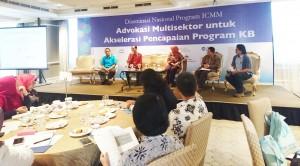
Originally posted on Johns Hopkins Center for Communications Programs
Results from a three-year operations research project show increased funding and use of long-acting contraception following evidence-based advocacy efforts
Funding for and uptake of long-acting and permanent contraceptive methods significantly increased in six districts in East Java and West Nusa Tenggara following advocacy using Advance Family Planning’s SMART advocacy approach. Results from the Improving Contraceptive Method Mix (ICMM) program show that contraceptive users in ICMM districts began shifting away from short-acting contraceptive methods and towards long-acting methods, which include contraceptive implants, intrauterine devices (IUDs), and male and female sterilization, as compared to users in control districts (which had no advocacy intervention).
According to ICMM baseline data, more than half of Indonesian couples who want to stop childbearing still rely on short-acting methods such as oral contraceptive pills and injectables. This mismatch of method with childbearing intentions points to the lack of availability and accessibility of LAPMs. ICMM sought to address this concern through targeted district-level advocacy—that is, working with decision makers to revitalize local advocacy groups and make the case for greater family planning budgets and increased availability and training for long-acting methods.
To do this, ICMM applied the Advance Family Planning Indonesia approach, which includes mapping a network of local stakeholders, training on cost projection for contraception, and using AFP’s SMART advocacy tool. ICMM was conducted in three districts in East Java (Kediri, Lumajang, and Tuban) and three districts in West Nusa Tenggara (Lombok Barat, Lombok Timur, and Sumbawa) from 2013 to 2016.
After leaders in all six districts increased family planning funding and implemented supportive policies, the study showed the odds of married women using LAPMs was higher—1.12 times the odds in East Java and 1.31 times the odds in West Nusa Tenggara. In control districts, there was no significant change. These increases showed that women in ICMM districts were more likely to use LAPMs after the advocacy intervention than they were before it.
“The results from ICMM are significant, because they show that advocacy is effective to reinvigorate family planning programs, expand the method mix, and more fully meet the family planning needs of women throughout Indonesia,” said Yunita Wahyuningrum, Project Director of ICMM. “Moving forward, we hope that this district-level approach can be scaled up to help the Indonesian government achieve their Family Planning 2020 (FP2020) goals.”
In addition to increasing use of long-acting contraception, ICMM districts also had increased levels of district and local support for family planning and coordination of services. Budget allocations at the district level for family planning information, education, and communication activities and community outreach increased at a statistically significant rate since 2013 in ICMM intervention districts from an average of 985 million Rupiah (about $74,000) in 2013 to an average of 1.3 billion Rupiah ($100,000) in 2016.
ICMM activities were designed to help the Government of Indonesia effectively uphold their commitment to revitalize and improve the country’s family planning program. While Indonesia was once hailed as a family planning success story, progress has stalled over the past decade.
“One explanation for Indonesia’s halted progress in family planning is decentralization, which began in Indonesia about 15 years ago,” explained Doug Storey, Principal Investigator of the ICMM study with Johns Hopkins Bloomberg School of Public Health. “Decentralization has resulted in uneven institutional support for family planning programs at the district and village levels. The advocacy approach applied through ICMM can help overcome the effects of decentralization and ensure that family planning programs are strong throughout the country.”
About ICMM:
Funded by the U.S. Agency for International Development and the Australian Department of Foreign Affairs and Trade, ICMM was led by the Indonesia office of the Johns Hopkins Center for Communication Programs, in partnership with Yayasan Cipta Cara Padu, the Center for Health Research, Universitas Indonesia, the Directorate of Maternal Health at the Indonesian Ministry of Health, and the National Population and Family Planning Board of Indonesia (BKKBN).

